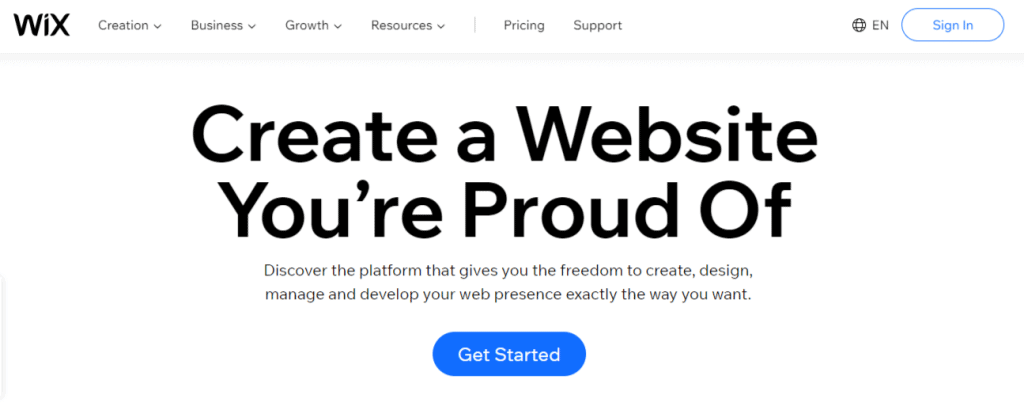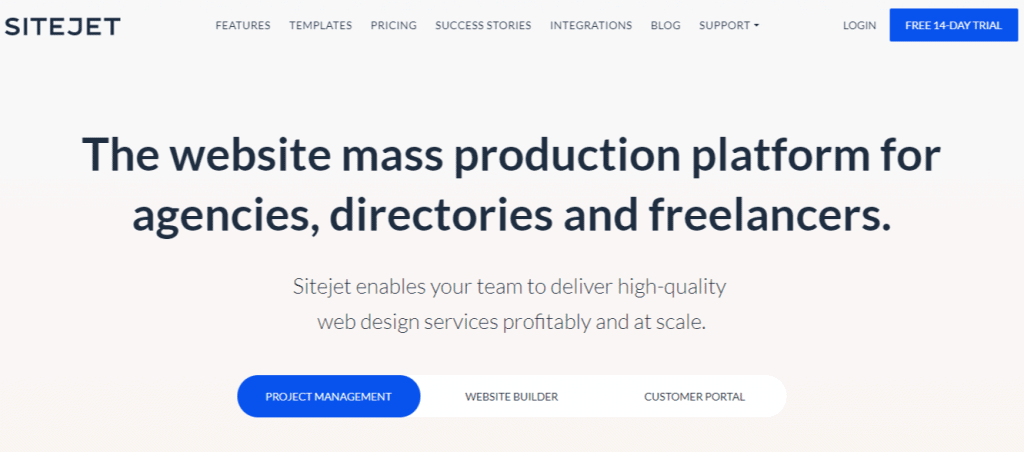There are many website-building tools, but the most popular one is probably WordPress; it is also considered the most used website-building tool. It contains a variety of plugins and themes, and it is very user-friendly as well. It provides you with everything you need. But there are also some other excellent alternatives for it since not everyone finds WordPress the most exciting tool for doing such work.
This article will introduce to you the best alternatives to WordPress. Of course, there are plenty of fantastic options, but you will see the ones that are among the best. Maybe you'll even find a perfect fit for yourself. So, let's begin!
1. Sitejet
This tool deserves to be in the first place! Sitejet helps you build high-quality professional sites. It also enables you to maximize creative design time with shortcuts, templates, and automation. It is an excellent solution for web designers and agencies that want to create websites and manage clients and projects.
Sitejet combines project management and automation with a high-performance CMS. Your web design business could become so much easier. You are given access to over 140 fully customizable pre-built and responsive sections and blocks. You get the opportunity to use more than a hundred templates to start designing your website, or if you want to, you can start with a blank page and create your own template. Every decision is all up to you.
There is plenty of options; you can either use a code or the drag-and-drop features, depending on your preference. You can also see all your current websites and their progress, all from one simple dashboard. However, all your projects and their status can be seen in the to-do manager.
This tool will surely give you the best results, compelling work, and happy customers. Sitejet contains all the features needed to design a perfect website that will match your clients’ requests. You should try it for sure. You will certainly not regret it!
2. Wix

Building a Wix website is easily done. A crucial move is to drag the elements around with a simple click of a mouse, and you drop them wherever you want to. Also, editing and adding video backgrounds and animations are not a big deal using Wix.
With over seventy categories for the design, Wix covers almost every type of business and answers every business owner's needs. It gets SEO right, too. It is not hard to use, and it is an excellent option for all users who want a website editor. It lets them customize whatever they want to.
However, it also enables you a lot of flexibility since it has a pretty wide range of designs you can choose from. Its simplicity and flexibility make an excellent choice for everyone who wants to create and manage their website the way they want.
3. Webflow
Webflow is an outstanding custom design tool. You can easily design your themes from scratch! It is one of the only website builders that includes a complete CMS that allows you to define custom collections with fields like rich text, files, photos, and much more.
This tool also consists of a separate, friendlier interface that you can hand off to your clients and teams. It is an excellent choice for everyone who wants to customize their website easily. It gives the flexibility of front-end coding without learning how to code, making it an excellent option for everyone.
Furthermore, with Webflow, there is a new way to build a website without any code, and the Designer tool is the would of this addition. If you put the Designer with eCommerce and CMS side-by-side, you will create something absolutely new and outstanding.
That is precisely what Webflow offers you. Great, right?
4. Squarespace
If you are a creative soul or want to be one, this might be a terrific fit for you! Squarespace is a visual, drag-and-drop website builder. It is trendy among creative users. Editing pages using Squarespace is intuitive and thoughtful, and they also have great taste when it comes to design!
Squarespace is known for its awesome templates. They have the best-in-class features, such as great blogging, photo galleries, eCommerce, and more. With Squarespace, you will not have to spend so much time looking for the perfect photo gallery plugin since it is already included.
In addition, you don’t even have to know anything about coding to be able to use this builder. Squarespace mobile apps allow you to edit pages, blog posts, and eCommerce functions on the go. This one indeed is worth giving a shot, especially if you want to show your creativity at its finest!
5. Weebly
If you are a small business owner, then Weebly is your jackpot. It's easy to use and comes with all the apps and features you need to help grow your site, from SEO to eCommerce. You can build a simple, stylish website site using Weebly’s drag-and-drop editor. It is a great choice for portfolios, blogs, online stores, and business sites.
It is a great option for small businesses, and it provides you with all the tools you need to build a business website or an online store. In addition, it contains some pretty unique and customizable templates and simple, stylish, mobile-responsive themes!
It has some beneficial SEO guides that provide you with some essential tips to improve your business. It is worth mentioning. Try checking it out a bit more so you can find out what else it can offer you!
6. Shopify
If you are looking for an easy-to-use alternative to WooCommerce, this is a perfect fit for you. Shopify is probably the easiest store builder out there. It provides you with pleasant, responsive designs that will make sure your store looks outstanding on any device, from small to a large screen.
Shopify has plenty of partners and developers, as well as a large community of users. This builder has some fantastic features to offer you. You will be able to create product variants, manage taxes, ship effectively, and even expand Shopify's capabilities via their App Store. Even though it is a great solution, it has a few drawbacks.
For example, working with multiple currencies isn’t as straightforward as it should be. Also, unless you use Shopify Payments as your default payment processor, they will charge a transaction fee for each sale you process, both online and offline. Anyway, it is a great tool that we indeed have to highlight.
FAQ
1. Do I need to use WordPress for eCommerce?
No, you don't. You have alternatives, such as Shopify, that make an excellent choice for doing that. It is easy to use and provides you with many outstanding features you will find helpful to create an eCommerce website.
2. What is the best alternative to WordPress if I want to start my blog?
You could try using Squarespace for starting a blog since it has a better blogging tool and better support than most competitors.
3. What is the best alternative to WordPress to build high-quality professional sites?
Sitejet provides you with everything you need to use for creating such websites, so you should give it a try.
4. Which website builder is the best one to use for a small business website?
Weebly is among the best builders for small business sites and portfolios. It’s easy to use, and it provides you with all the apps and features you need to grow your website, all the way from SEO to eCommerce.
Conclusion
These website builders are becoming dominating tools in the last couple of years. Their main focus is on classic websites. However, the majority will also let you create your online store intuitively and visually. WordPress is probably the most popular and outstanding website builder out there. But it is important to remember that being the most popular one doesn't make it the only one.
There are so many great alternatives to it that you may find great for your needs. Several tools will be great for designers, and even beginners will find them relatively easy to use. There is no rule to use them. You don't need to be a professional. Even if you don't consider yourself a technology-oriented person, some website builders such as Wix, Squarespace, or Weebly offer plenty of advantages.
You can see the result right away when using those tools because you are working on the website itself. That is where they differ the most from WordPress, where you use an abstract editor. Those website builders show you what you get right away.
All the listed tools come with certain features you might want to check to see if they contain what you need for your business. Also, you can find some additional information on their official websites. Then you will be able to make sure if you want to use them. However, all those tools listed above are worth mentioning and exploring.
Hopefully, you will find the alternative that will fit you the most. Good luck!

